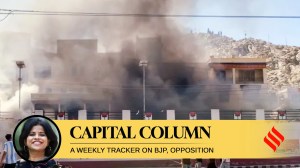On the Judeo trail
The CBI is ostensibly hard on the Dilip Singh Judeo trail. Judeo, on his part, is hard on the campaign trail, winning hearts and minds in Ch...

The CBI is ostensibly hard on the Dilip Singh Judeo trail. Judeo, on his part, is hard on the campaign trail, winning hearts and minds in Chhattisgarh as the ‘Wronged Raja of Jashpur’. Ten days after The Sunday Express published the cash-on-camera expose, there has been hardly any progress in investigating the glaring message from the tape—the focus, instead, has been on the medium. Investigations, it appears, are on in full swing — not into why a Union Minister is seen accepting illegal gratification but into which political party is playing what kind of a role in the tape.
So successful has this investigation been, that the CBI — which wears the three words of “industry, impartiality, integrity” as its motto — has yet not gotten round to inviting Judeo for a chat. CBI Director P C Sharma has clearly said that his organisation is doing its job professionally and fairly but it would need to show more evidence of this. In fact, the manner in which the CBI conducts this probe could be a litmus test of its professionalism. Even a cursory reading of the Prevention of Corruption Act, 1988, would reveal how seriously the crime of bribery is viewed if committed by “any person in the service or pay of the Government”. Yet, barring a few honourable exceptions, the dominant discourse within the ruling party has been focused on the possible motivations of the people who had conducted the sting operation. Perhaps it is the fractious atmosphere of electioneering that has led to this political astigmatism but it does the reputation of this country, which performs dismally in Transparency International’s corruption index, little good. It signals an apathy on the part of the country’s leadership and regulatory authorities to slay the demon.
That is why L K Advani’s recent observation on the need for more transparent party funding is welcome. The Deputy Prime Minister has put it on record that one way to ensure that dubious money does not make it into the political sphere is by enacting a law facilitating party funding through cheques. We need to deliberate on ideas like this one, instead of dodging the issue, or pretending that it does not exist. When The Indian Express published the Judeo tape story on November 16, it was done because it provided a telling snapshot of the murk that marks our politics which would, in turn, lead not just to exemplary punishment being meted out to those involved but political reform in the long term. We are still waiting for indications of this.





- 01
- 02
- 03
- 04
- 05


























